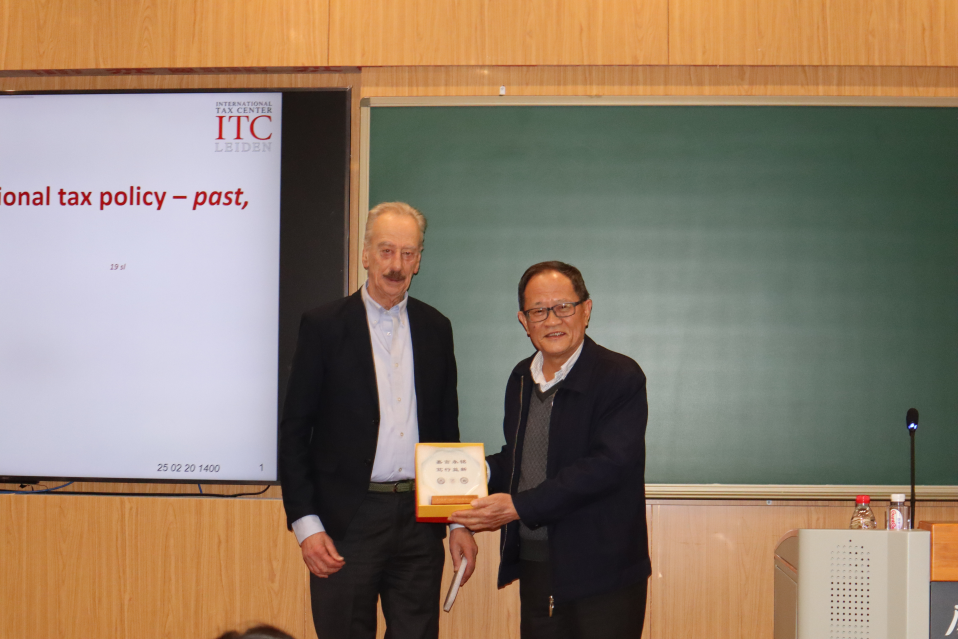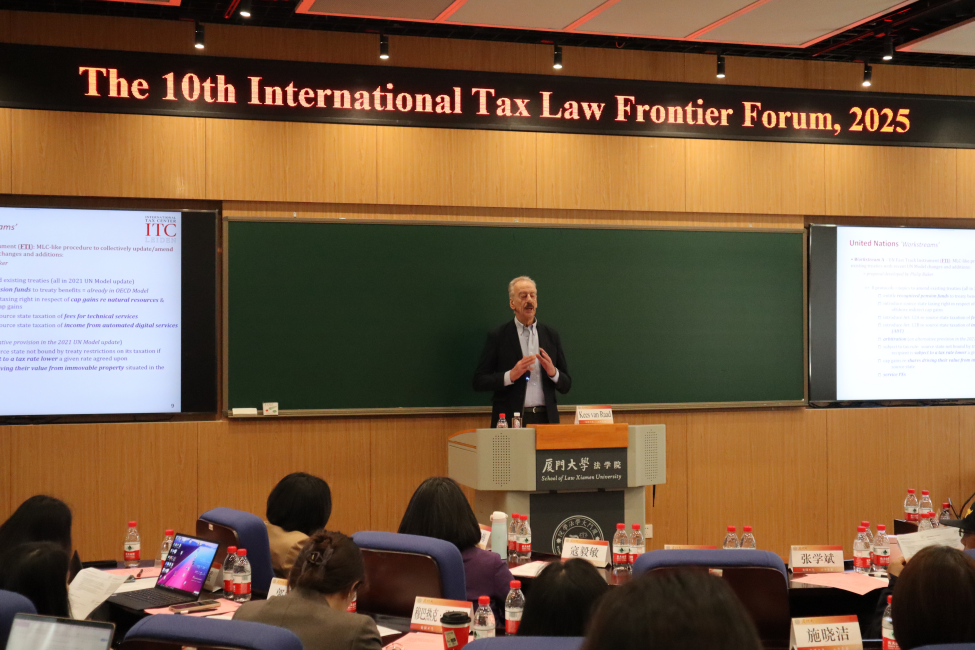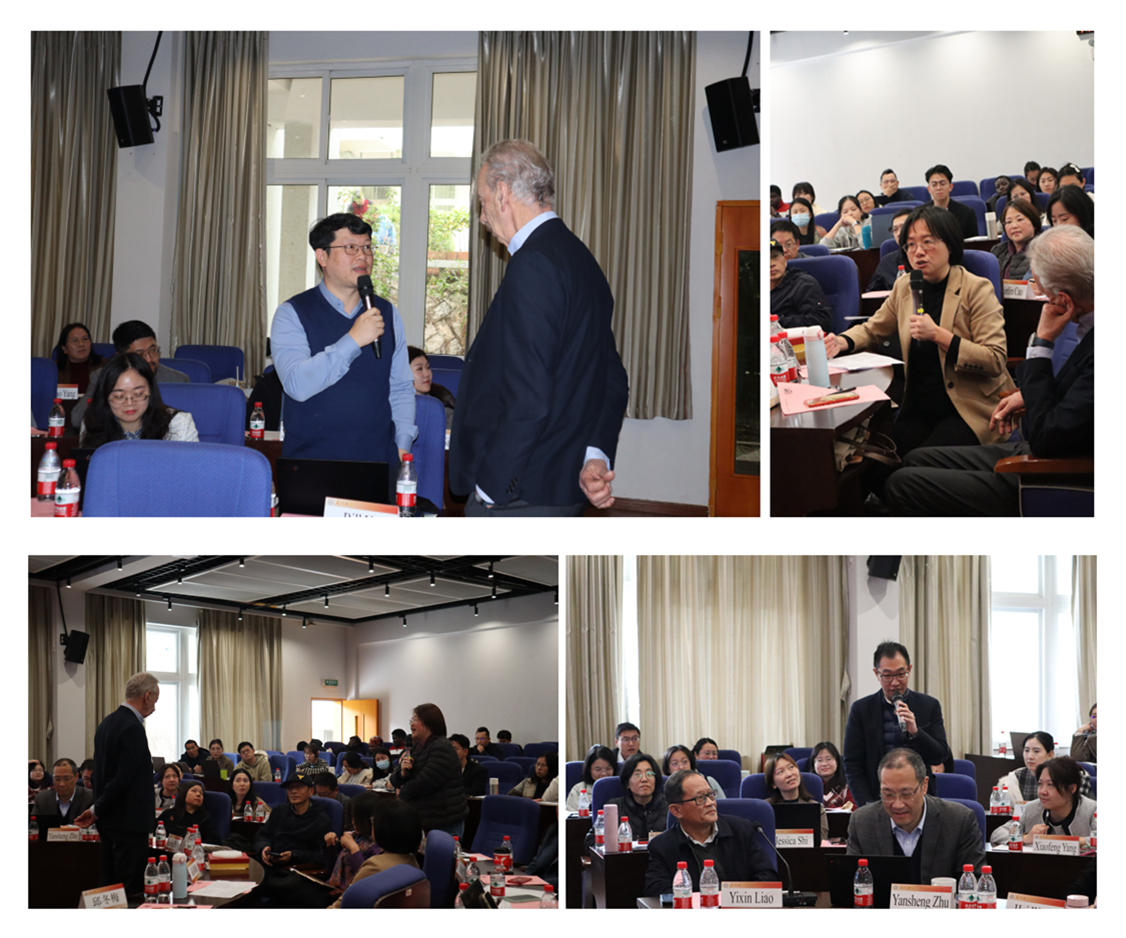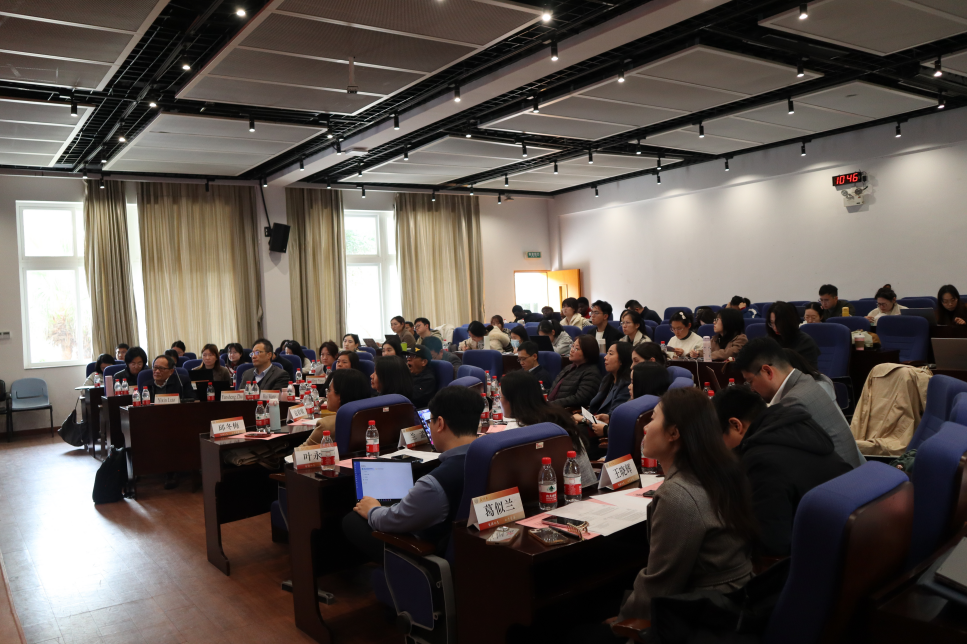On the morning of February 22, 2025, the 15th "Yixin" Academic Tax Law Lecture was held in the B138 Lecture Hall of the Law School as the opening lecture of the 10th International Tax Law Frontier Forum. The lecture was delivered by Prof. Kees van Raad, former Director of International Tax Center at Leiden University in the Netherlands, and focused on the topic of "The United Nations and international tax law – the 2025 update of the UN Model and the UN's international tax policy leadership aspirations". The lecture was hosted by Prof. Liao Yixin, Director of the Center for International Tax Law & Comparative Taxation at Xiamen University, and was attended by guests of the 10th International Tax Law Frontier Forum, as well as master's and doctoral students of Finance and Tax Law. The event was well-attended and well-received.

At the beginning of the lecture, Professor Liao Yixin presented Professor Kees van Raad with a commemorative plaque of the Yixin Lecture, after which the lecture commenced formally. Prof. Kees provided a review of the development of the UN Model Tax Convention. He highlighted significant milestones, including the establishment of the OEEC in 1984, the reconstruction of Europe through the Marshall Aid Plan, the emergence of cross-border double taxation, the transformation of the OEEC into the OECD, the development of the OECD Model Convention, and the gradual participation of more and more countries as members or non-members in the OECD Model Convention, which laid the foundation for the existing tax conventions. UN also recognized the issue of double taxation and invited four experts to draft a report on the subject in 1921, subsequently leading to the preparation of nine tax treaties under the guidance of Mitchell B. Carroll. In 1980, UN introduced the UN Model Convention, drawing upon the framework of the OECD Model Convention. This convention underwent several updates following 2001, including the addition of Art. 12A, Art. 12B, and Art. 13, some of which have gradually diverged from the OECD Model Convention. Prof. Kees elaborates on the conditions for the application of the added provisions and their implications, and explores possible changes and developments in the UN Model Convention.

Prof. Kees then described the progress of the work of UN Tax Committee of Experts (UN-TCE) and explained the three work streams related to the digitized and globalized economy, as well as the UN's aspirations to replace the OECD as the world's international tax policy maker. Prof. Kees pointed out that UN-TCE's 25 experts have come together to update the UN Model Convention and the UN Commentary, in addition to researching and publishing reports on issues such as transfer pricing. Prof. Kees also discussed recent developments in software royalties, giving examples of the relationship between copyrights and royalties, and by extension the scope of application of software royalties. Prof. Kees further explained the three work streams of UN-TCE's Sub-committee on Taxation Issues Related to the Digitized and Globalized Economy: the Fast Track Instrument (FTI), income from cross border services, and cross-border taxation of remote workers. Prof. Kees elaborated on the revisions to the FTI, in particular on the discussion of arbitration provisions. He elaborated on the potential conflicts in the interpretation of different provisions and explained the role of arbitration in it through case studies. For income from cross border services, Prof. Kees pointed out that Work Stream B would further consolidate the provisions in the UN Model Convention relating to service permanent establishments, fees for technical services and independent personal services. Workstream C focused on the cross-border taxation of remote workers, and Prof. Kees mentioned that the UN might add a fourth paragraph to Art. 15, whereby the employer's resident state would be obliged to credit the employee's resident state's tax on the income from that employment, extending the employer's resident state's taxing rights to cover the employee's salary for the relevant work performed in a third state.
Prof. Kees then provided an update on the UN's progress in advancing the development of a Framework Convention on international tax cooperation, presenting the Terms of Reference (ToR) for the convention. In 2023, the the UN's Economic and Financial Committee ('Second Committee') adopted the final version of the 2022 draft resolution and plans to finalize the negotiation of Terms of Reference (ToR) for a Framework Convention by the end of 2024. Prof. Kees noted that while developed countries such as the United States, the United Kingdom, and Australia voted against the draft resolution, the majority of developing countries voted in favor of it, reflecting the differences in interests and roles between developed and developing countries. This, in turn, influenced the formulation of the details of the convention. Prof. Kees also cited the example of the United States to illustrate the role of the United States in international taxation and the decisions it has made as a result, further explaining the position of developed countries in global international tax policymaking, while emphasizing the world's current need for an umbrella framework convention in addition to the OECD's Inclusive Framework.

During the Q&A session at the end of the lecture, Associate Professor Qiu Dongmei of Xiamen University, Lawyer Ye Yongqing of the Beijing King & Wood Mallesons Shanghai Office, Shi Xiaojie, Tax Director of DSM China, and Wu Qinglun, a senior practice expert, exchanged views with Prof. Kees on the subject of harmonizing the relationship between FTI and existing MLIs, the potential role of the the United States in the UN Framework Convention following Trump's rise to power, the application of software royalties in the context of emerging technologies such as AI, the CCCTB methodology for calculating tax rights allocation in Europe, and the potential future implications of aggressive tax policies adopted by Trump.
The lecture concluded with a lively discussion, during which the guests expressed that they had gained a great deal of insight into the United Nations' unique perspective and future direction in global tax governance. The atmosphere was highly active, and the exchange of ideas was robust, inspiring the participants to consider more profound issues in the field of international tax law.

(Article by Zhou Junrui, Photos by Zhang Lu)